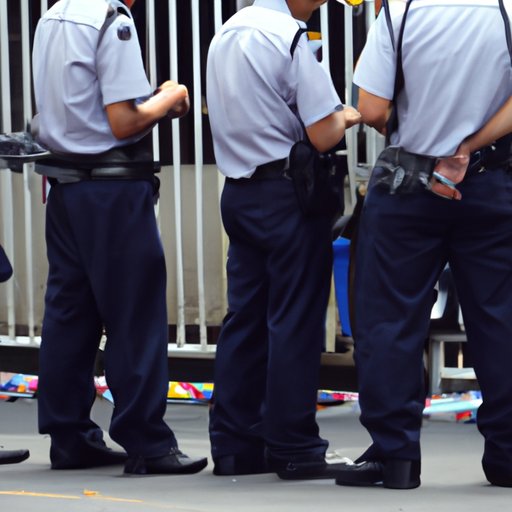
I. Introduction
Being arrested by an off-duty police officer can be confusing and alarming. It is important to know your rights and understand an off-duty officer’s arrest powers to avoid legal trouble. In this article, we will explore whether an off-duty cop can arrest you, their authority, and the potential consequences of being arrested by an off-duty officer.
II. Off-Duty but On-Alert: Understanding an Off-Duty Police Officer’s Arrest Powers
An off-duty police officer has the same authority to arrest as an on-duty officer when witnessing a crime or when protecting themselves or others from imminent harm. However, an off-duty officer’s authority to arrest may be limited by department policies or state laws.
Generally, an off-duty officer can make an arrest in any situation where a private individual may do so. For example, if they witness a crime being committed, they can make an arrest. They can also make an arrest if they have reason to believe that a felony has been committed and they have probable cause to believe that the suspect committed it.
III. Know Your Rights: What an Off-Duty Cop Can and Cannot Do
Off-duty police officers are allowed to carry their firearms and are obligated to intervene if they witness a crime or see someone in danger. They can also make an arrest like any private individual, but only if it is necessary to protect themselves or others from imminent harm.
It’s important to note that an off-duty officer’s jurisdiction may be limited to their own city and state, but some departments allow their officers to exercise their arrest powers even outside of their jurisdiction in emergency situations.
IV. Arrest or Citizen’s Arrest? The Fine Line for Off-Duty Police Officers
There is a fine line between an off-duty officer’s lawful arrest and a citizen’s arrest. When making a lawful arrest, the officer is acting as an agent of the government and has the authority to bring charges against the suspect. In contrast, a citizen’s arrest is when an ordinary citizen makes an arrest because they believe a crime has been committed and holds the suspect until law enforcement arrives.
For a citizen’s arrest to be legal, the individual must have witnessed the crime being committed and have a reasonable belief that the suspect committed it. Additionally, they must immediately turn the suspect over to law enforcement.
V. What Happens When an Off-Duty Police Officer Takes the Law into Their Own Hands?
When an off-duty officer makes an arrest, it can lead to potential consequences, including legal and ethical implications. If the arrest was made without proper authority or based on bias or prejudice, it may lead to a lawsuit or an investigation by the department.
Furthermore, an off-duty officer who makes an arrest may be held to a higher standard by their department and the court system. If the officer is found to have used excessive force or acted inappropriately, they could face disciplinary action, criminal charges, or even be dismissed from their position.
VI. Off-Duty Officers: The Unseen Protectors, But at What Cost?
Off-duty officers provide additional security and protection to their community, but this role can come at a cost. Many departments do not provide additional training or guidelines for off-duty officers, leading to situations where an officer may act outside of their authority or make a mistake while attempting to make an arrest.
Additionally, an off-duty officer who is involved in a civilian dispute may face personal liability if they are not acting within their scope of employment. This could lead to a civil lawsuit against the officer, which can be financially and emotionally devastating.
VII. Legal Implications of an Off-Duty Police Officer’s Arrest: A Comprehensive Guide
If an off-duty officer makes an improper arrest, it could lead to legal implications for both the officer and the department. The officer could face disciplinary action or criminal charges, and the department could be held liable for the officer’s actions.
It’s important to note that if an off-duty officer makes an arrest without probable cause or outside of their authority, the arrest may be deemed unlawful and the charges against the suspect may be dropped.
VIII. Conclusion
Understanding an off-duty officer’s arrest powers is crucial for legal safety. An off-duty officer has the right to make an arrest in certain situations, but their authority may be limited by department policies or state laws. Additionally, they may face consequences if they act outside of their authority or make an improper arrest. It is important to know your rights and ensure that off-duty officers are acting within their scope of employment.




